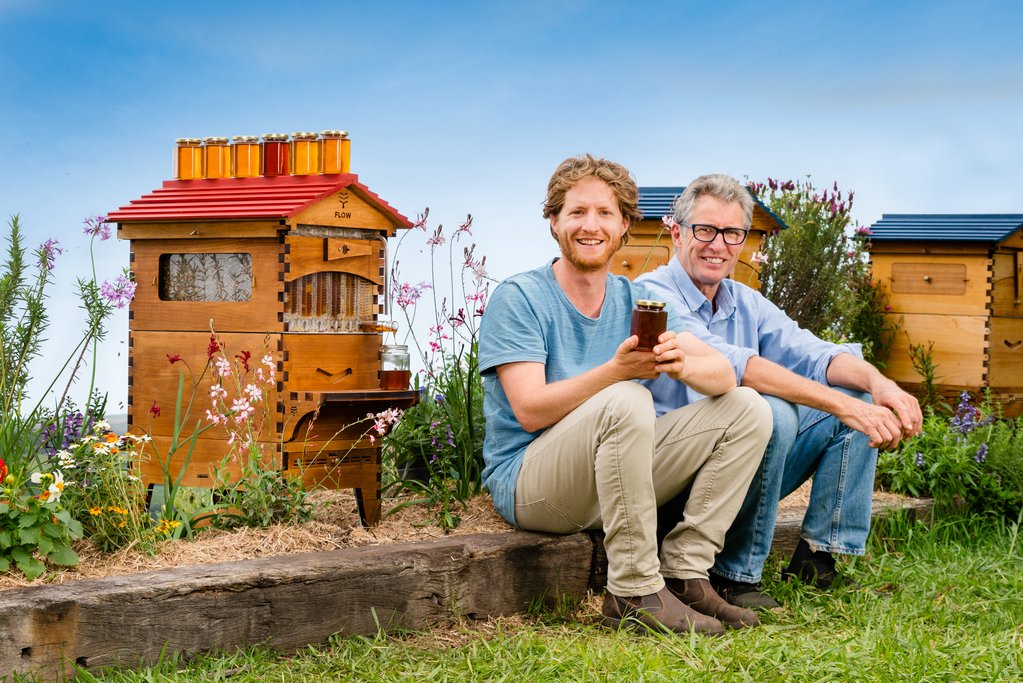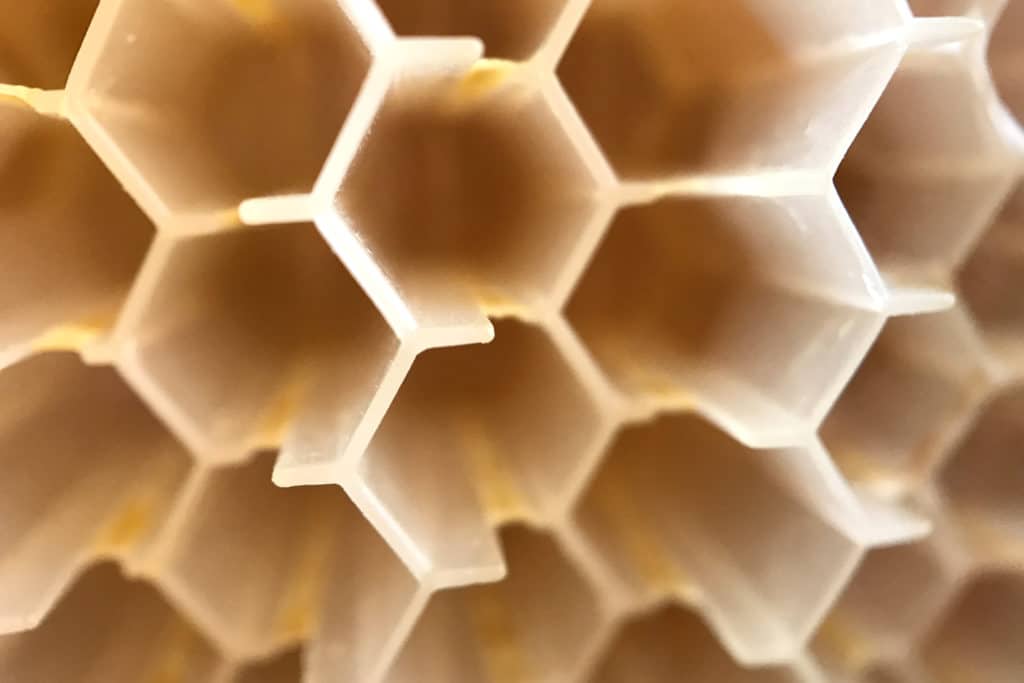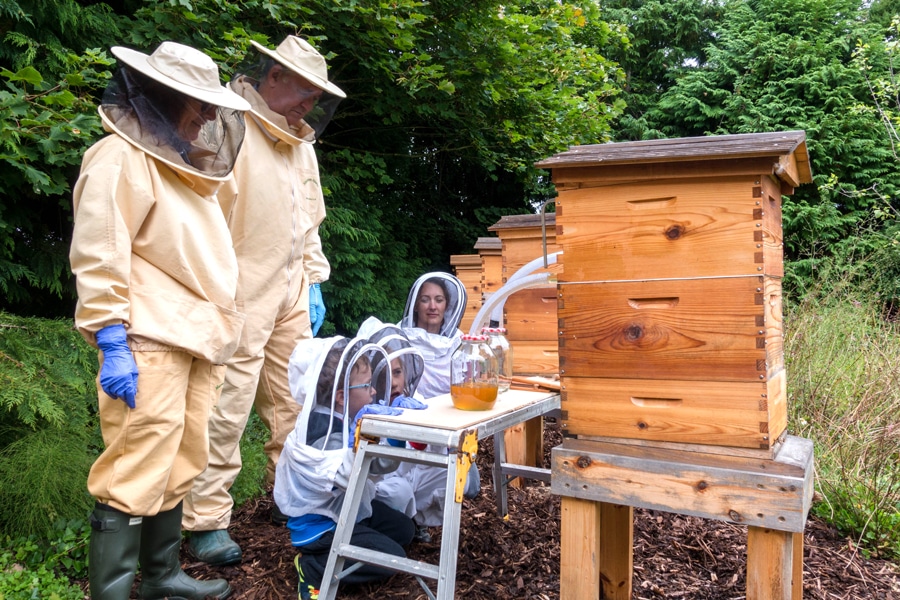Australia (Byron Bay)
Australian start-up Flow is bringing beekeeping to the masses with their Flow Hive that reduces stress both for bees and keepers, and promotes a more pro-pollinator approach to farming.
Time and again we hear the typical excuses as to why people don’t keep bees: they don’t have the time, they live in a small apartment, they’re terrified of being swamped by an angry cloud of tiny, six-legged honey-farmers, and so on. But what if there’s a way to take the sting out of apiculture? Meet the Australian start-up bringing beekeeping to the masses.

Flow founders Cedar and Stu Anderson.
Flow began as father-and-son team Stu and Cedar Anderson’s plan to create a happier home for their honey bees. “Pollinators are essential to life as we know it,” explains Stu, noting that our fuzzy friends are the backbone of agricultural crop production – the fruits and vegetables we eat, along with livestock feed – “but global insect populations are crashing at an alarming rate.”
This population crash isn’t helped by the fact that traditional methods of harvesting honey can be damaging to the bees producing it. A typical hive must be opened up in order to scrape honey from the honeycomb cell frames inside. This can be a traumatic experience for the insects, and to keep them calm keepers must smoke the hive in order to mask the distress pheromones the bees release. Also, no matter how careful the handler, the extraction and re-installation of the frames inevitably results in crushed members of the hive. Fewer bees means poorer pollination, and agricultural crop yields suffer as a result.

The Flow Hive has been developed to reduce stress both for bees and beekeepers. The BPA-free frames have a split-cell mechanism, which the bees plug with wax and fill with honey. A key is then inserted to open up the cells, allowing the contents to flow down through a tube and straight into a jar. The insects remain between the frames throughout the whole process, so nobody gets stung and potential bee-crushing is kept to a bare minimum!

The honey harvest. Photo: Flow
While the project has flourished as a tasty way for people looking to get hands-on experience with beekeeping in their own gardens – the Flow Hive community has 75,000 members worldwide – the wider implications for farming are buzzing with potential. Partnering with Australian charity, Wheen Bee Foundation, the Flow team have assisted in founding the Bee Friendly Farming Programme – a farmer-focused initiative which encourages crop growers to protect our most precious natural helpers. Wheen Bee CEO, Fiona Chambers, explains that the movement has solid scientific backing, ensuring that the programme “supports bees and other pollinators to thrive under Australian conditions whilst optimising the benefits to landholders.” Chambers likely feels the need to defend the “solid scientific backing” of the project because while the Flow Hive can reduce the stress on kept bees, it has not necessarily done the same for the project’s founders. Many in the traditional beekeeping community spoke out vehemently against Flow criticising the design, the marketing and, of course, the impact it might have on the sector.

Farmer Mike Hogan. Photo: Flow
Organic farmer, Mike Hogan is one of a growing number of bee-friendly enthusiasts. “Looking after the bees is looking after ourselves and giving back to the environment”. He sees the Bee Friendly programme as a necessary step in getting farmers to adopt a more pro-pollinator stance towards their work, but adds that it will take a wider community effort to help preserve the insects’ welfare. A Flow Hive in every backyard or balcony really could make a big difference in the years to come.
And while there is heavy lifting to be done to persuade pesticide companies to manufacture more gentle chemical sprays, Mike has some simple solutions that farmers can implement to show the bees a little TLC. Planting fragrant blooms, such as magnolias, around farmland attracts pollinators. Once seeded, the plants then go on to feed birds like the king parrot, helping to create a more rounded local ecosystem. Keeping a variety of crops (coffee, sunflowers, pinto peanuts etc.) also makes for a more biodiverse environment, ensuring nectar and pollen availability throughout the year. “It’s not arduous,” he says, “it’s working with nature, for nature.”

The honey bee at work. Photo: Flow
AtlasAction: Help out by opting for locally-sourced honey, producing it yourself in your own Flow Hive, growing or buying pesticide-free produce, supporting Wheen Bee, and keeping pollinator-friendly plants. So many ways to help! Read more about farming and food.
Bio
Holly is a translator, turned scriptwriter, turned journalist based in Barcelona. She enjoys food, comedy, and occasionally going outside.
Project leader
Cedar Anderson and Stu Anderson, co-founders
Support the Atlas
We want the Atlas of the Future media platform and our event to be available to everybody, everywhere for free – always. Fancy helping us spread stories of hope and optimism to create a better tomorrow? For those able, we'd be grateful for any donation.
- Please support the Atlas here
- Thank you!

